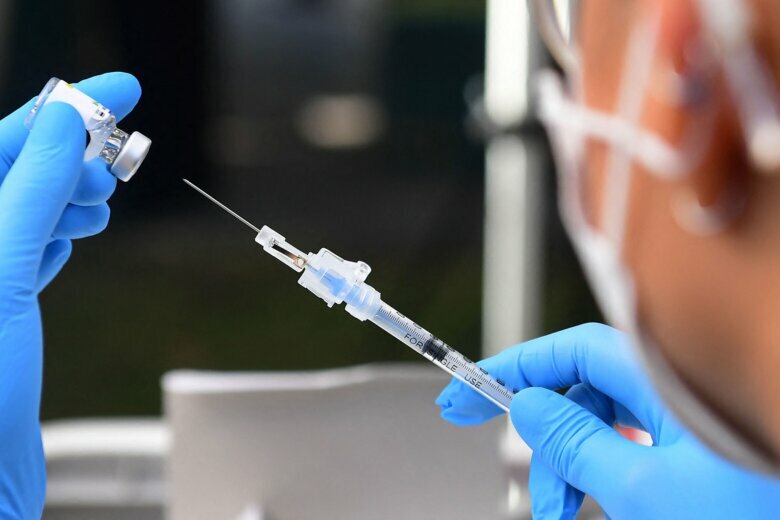
A new Kaiser Family Foundation (KFF) poll found that the highly transmissible Delta variant, overburdened hospitals and knowing someone who has died or become seriously ill from Covid-19 drove recent increases in vaccination.
Among those vaccinated since June 1, 39% said they were motivated by transmission of the Delta variant, 38% by the growing burden of Covid-19 on hospitals and 36% by knowing someone who became seriously ill or died.
Thirty-five percent said a major reason was to participate in activities where vaccinations are required, such as traveling.
Nineteen percent said it was because it was mandated by their employer.
Fifteen percent of those newly vaccinated since June said they were motivated by the US Food and Drug Administration’s full approval of Pfizer’s vaccine, but this was only cited as the main reason for vaccination by 2% of the studied population. The Pfizer vaccine had previously been available for people 16 and older under emergency use authorization.
The report said 19% of the recently vaccinated said social pressure from family and friends was a major reason for getting vaccinated; 5% said it was the main reason.
The KFF poll was conducted from September 13-22 and includes a nationally representative sample of 1,519 adults. The margin of error is plus or minus 3 percentage points.
The report said those living in areas with high numbers of Covid-19 cases and deaths were more likely to say they had been vaccinated since June 1 — nearly a quarter of vaccinated adults surveyed in high-case counties said they were vaccinated after then.
Current data from the US Centers for Disease Control and Prevention shows 77% of American adults have had at least one dose of vaccine.
Since July, the largest increases in vaccination rates were among those 18-to-29 years-old — a rise of 11 percentage points — and Hispanic adults — an increase of 12 percentage points, KFF said.
However, the US now faces stagnating vaccination numbers.
On Monday, the US reported a seven-day average of 231,695 people initiating vaccination each day. This is the lowest this number has been since the middle of January, and a 47% drop from the average a month prior.
In the KFF report, some of the biggest lags in vaccination were in low-income populations, rural populations and among Republicans.
Adults under the age of 65 without health insurance were the least likely to be vaccinated in this study, with only 54% reporting they had begun vaccination.
Majority surveyed think Covid-19 is here to stay
The majority of American adults surveyed think Covid-19 will persist in the United States, similar to seasonal influenza, according to KFF.
In its new update, 79% of adults said they believe Covid-19 will continue at a low level as “something the US will learn to live with and manage.” Only 14% said they thought the virus would be eliminated.
The idea that the virus could be eliminated was more popular among unvaccinated adults than in vaccinated adults, with 18% of unvaccinated adults saying Covid-19 will be eliminated in the United States, compared with 13% of vaccinated adults.
“The public appears resigned to a future in which Covid-19 remains present in the US and is managed much like the seasonal flu rather than one in which the disease is completely eliminated,” the report said.
Among survey respondents, 36%, said they would be “satisfied, but not enthusiastic,” if Covid-19 were to persist like seasonal influenza, and 35% said they would be “dissatisfied, but not angry,” with this outcome.
Almost 1 in 4 Democrats surveyed said they would be angry with this outcome, while Republicans were most likely to say they would be satisfied but not enthusiastic.
Divided views on boosters
Booster discussions increased the public’s confidence in Covid-19 vaccines overall, the new poll suggests, but that wasn’t the case for people who aren’t vaccinated.
It found 62% of adults said the news of the potential boosters “shows that scientists are continuing to find ways to make vaccines more effective” while one-third say it “shows that the vaccines are not working as well as promised.”
Among the unvaccinated, 71% said the news that some may need boosters was a sign vaccines aren’t working.
US health officials have emphasized that the available vaccines continue to provide strong protection against Covid-19, but some people — such as older people, people in long-term care facilities and people at higher risk due to underlying conditions or their jobs — may benefit from a booster dose.
The poll was conducted before boosters were available, although immunocompromised people were already recommended to get third doses of mRNA vaccines.
As discussions around Covid-19 vaccine booster doses heated up, the majority of adults had heard about the possibility of an additional vaccine dose. About 45% of US adults surveyed said the information they had seen was helpful and 38% said it was confusing, according to KFF data. But that gap widened based on vaccination status.
More than half, 54%, of adults who were at least partially vaccinated said they found booster information helpful. Only 24% of unvaccinated adults found booster information helpful, and 45% of the unvaccinated adults said they found it confusing.
In the fully vaccinated population, 55% said they would “definitely” get a booster if recommended; 3% of adults surveyed said they had already received an additional dose.








